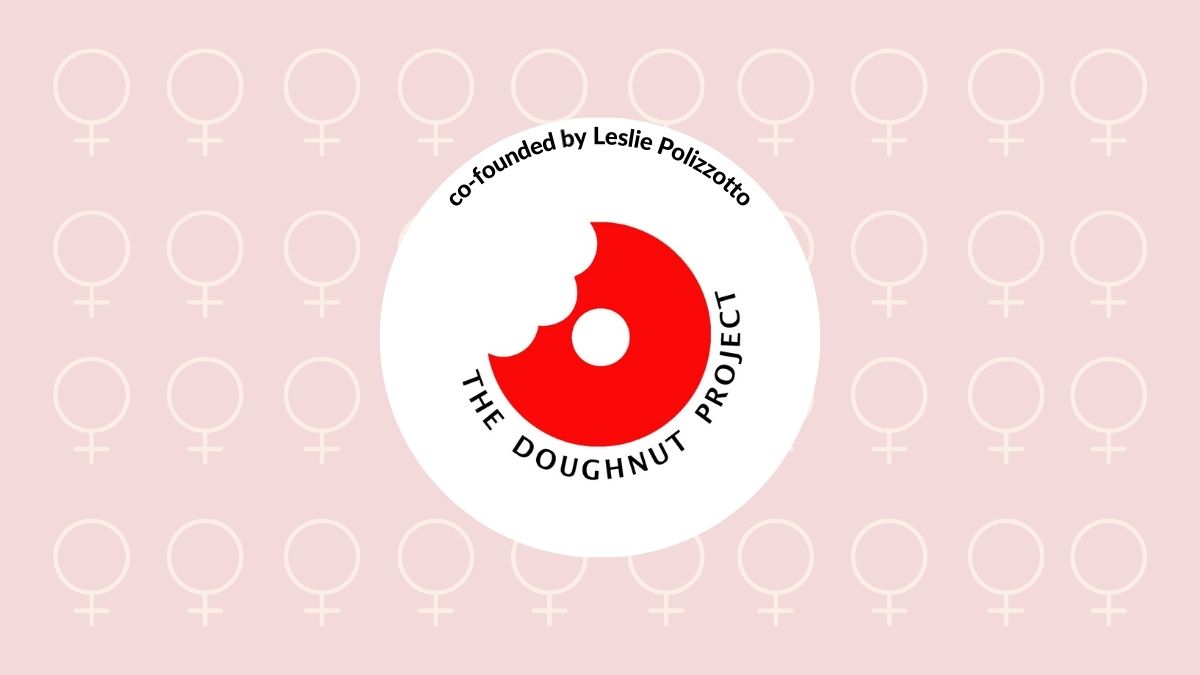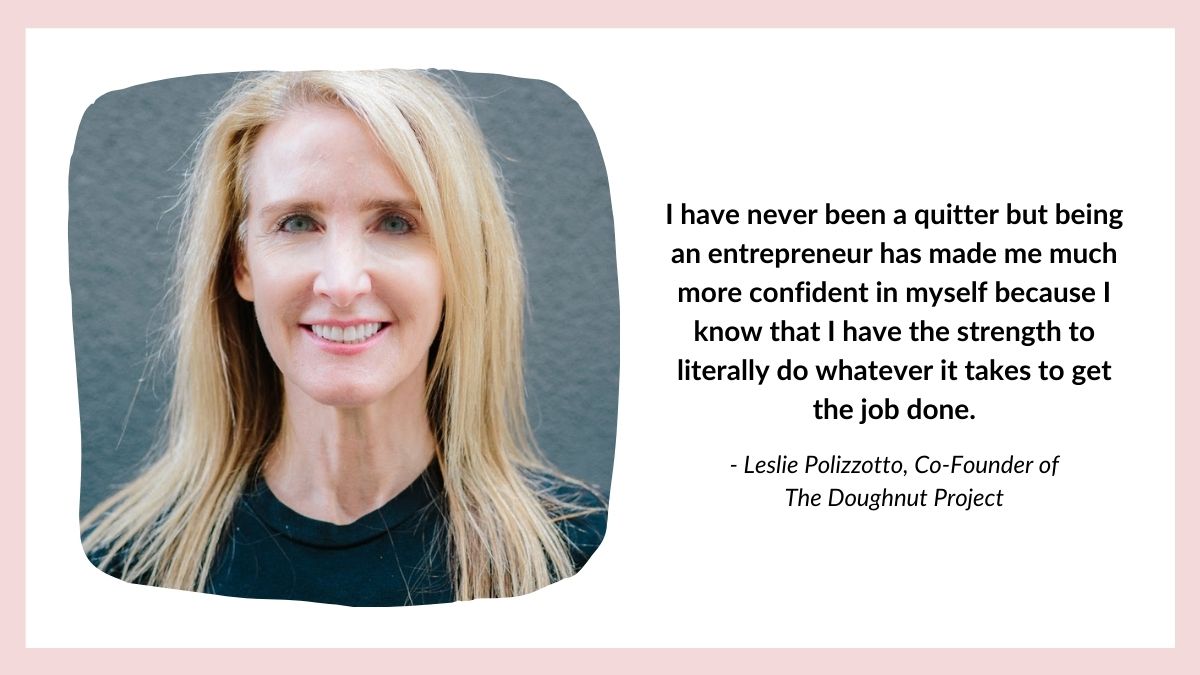Leslie Polizzotto – From practicing law to running a doughnut shop
February 10, 2021

Unless you’ve been living under a rock you know that the most famous reality star and renowned entrepreneur Kim Kardashian is studying to become a lawyer. If this sounds crazy to you, imagine someone who already had a career in law and a comfortable salary to quit just to open a doughnut shop. Insane, right?
Well, not so much. Leslie Polizzotto says she’d rather grind all day and night for The Doughnut Project, her own brand, than go back to writing memos and briefs for 10 hours a day. If entering the entrepreneurial world was somehow fate, creating a world-famous brand was all a result of hard work and determination.
Pre-pandemic, their one-of-a-kind flavours were a real tourist attraction in NYC. And with all the cross-brand collaboration and growth mindset, there’s no doubt Leslie will welcome tourists back to the shop better than ever once the nasty virus is gone.
Feeling under-appreciated as an employee, a nonexistent work-life balance, financial struggles, getting out of bad relationships – these are the most common triggers that push women to become entrepreneurs. Tell us about your trigger?
It wasn’t really a trigger for me, rather it came down to timing. My husband and I had moved from California to New York. After passing the NY Bar, I had begun to temporarily practice law waiting for the firm where I practised in California to need an associate in their New York office.
It was more of an opportunity presented to me in a field I was very interested in (Food!) and I had the support of my husband to make the change. Interestingly, when my business partner and I were deep into creating our business plan and meeting with possible investors, my law firm reached out to tell me they had an open position for me, and I declined. I guess once I was on the journey to make The Doughnut Project a reality, the idea of going back to researching and writing memos and briefs in an office for 10 hours a day didn’t seem like the right decision. I was very fortunate to be able to give up a six-figure salary and take such a risk. Most people do not have that opportunity.

How did you come up with your business idea?
The decision to launch The Doughnut Project was actually a situation where the stars aligned. I met my future business partner Troy Neal when my husband and I were travelling back and forth between California and New York.
He was a bartender at a restaurant we would go to in NY. He was super charismatic and lots of fun. We instantly hit it off. He told me that he wanted to open a doughnut shop. I pulled out my phone and showed him all the pictures that I had taken of doughnuts when they would be brought into the law firm where I worked and how happy they would make me feel. I told him that I was going to be moving to NYC and I wanted to be involved somehow. I think he thought I just wanted to be an investor, but little did he know I was going change my entire life to make The Doughnut Project a reality.
Once I had moved to NYC, we met over a long period of months to write a business plan. We decided that we wanted to make our doughnuts like none other. We took inspiration from food and cocktails to create the flavors for our doughnuts using ingredients like beets, olive oil, ricotta cheese, black pepper, bacon, etc. It was our unique take on flavors that got us noticed. Four months after opening, our “Everything Doughnut” put us on the global map of places to visit in NYC.
Have you had support from someone, even if just encouragement? Who was that and how did it help you?
My husband was extremely supportive and was the person who actually encouraged me to take the risk and leave practising law to become an entrepreneur. He has owned his own business for over twelve years and thought I would be good at running my own business. I am sure other people, such as legal colleagues, thought I had gone insane!
Female entrepreneurs are often underestimated and overlooked. Have you ever felt at a disadvantage?
I have never felt at a disadvantage but having a male co-founder it seemed that he was always thought to be the person responsible for the business’s success.
Some say it’s hard work, others say it’s talent and resourcefulness that play a crucial role for success in entrepreneurship? Which traits have been instrumental for your success so far? And why?
I have always been a motivated and driven person. Once I have a goal, I do everything in my power to achieve the goal. That said, I have always found it difficult to delegate and to trust that other people will do as good of a job as I would, so I tend to micro-manage. Unlike being an attorney where I could control my success, having a doughnut shop takes a team of people. I have made great strides in learning to let go and empowering others.
What excites you the most about being an entrepreneur?
Share with us some of the worst business advice you’ve ever received?
I told a prominent Food Network chef and personality who at the time had a restaurant in NYC that I was going to open a unique, gourmet doughnut shop. He told me “Don’t do it!” I thought that was a horrible thing to say to me, but of course, it actually made me want to do it even more to prove him wrong…which I did.
You’ve got a high stake investment opportunity. Pitch your business in 150 words.
The Doughnut Project is a globally known doughnut brand that is trademarked and has great potential for licensing opportunities. The brand is known for its unique flavors and collaborations with brands to create custom doughnuts for events and product launches. Known as one of the best doughnut shops in the United States, the brand has received tremendous press about its hand-crafted doughnuts and has been featured on national and international television shows.
What’s the best piece of advice you’d give to inspire aspiring entrepreneurs?
First, you have to love the concept or product that you are selling. Owning a business is an everyday endeavor which becomes a part of your life. You do not turn off business thoughts and contemplation just because you are at home making dinner, out with friends, or on vacation. So, you REALLY need to like what your business is about.
Second, you need to partner with people who have skills that you do not. That makes for a more well-rounded team who can all bring something to the table.
Third, you need to have the support of your spouse, partner, family member, or significant other because without their positivity and encouragement, it will only add stress and pressure to a situation already overwhelming. My husband is a sounding board and hears not only about our successes, but also my complaints, fears and worries. He offers his advice as a business owner himself. It is good to have that source of “therapy” to release negative feelings so you can move on to more positive solutions.
What are your goals for the upcoming year?
A lot of my plans are contingent on the length of the pandemic. When tourism is allowed to return, people return to office buildings, and there are events and weddings, etc. there will be more opportunities to sell doughnuts. When the pandemic subsides, I plan to slowly add staff and increase doughnut production. I will continue securing collaboration partners. I will also re-ignite conversations with people who want to license our brand to open The Doughnut Project internationally.
How has your business changed since the pandemic?
The COVID-19 Pandemic actually changed our business model. Pre-COVID, my former business partner and I had stepped away from daily operations to focus on growing the brand. We had two business locations open 7 days a week and 25 employees. I was miserable! It was so stressful trying to keep two locations running smoothly. In late March, when NYC was shut down due to the pandemic, we had to lay off all but 1 employee. We closed our second location. My former business partner and I, along with our head pastry chef Maddie Chunka, kept the original location up and running 5 days a week with limited hours.
We became extremely busy, specifically on the weekends. People were looking for some form of normalcy during this challenging time and would drive from all over (Connecticut, New Jersey, Long Island) to get our doughnuts. We kept creating new and exciting weekend specials and posting on Instagram which would bring customers back each weekend to get the latest doughnut. We realized many efficiencies with such a small team and made many improvements to how we operate. I realized that I was so much happier back in the daily operations of the business.
My business partner recently left the business to move back to Seattle to be with his family. I now manage every aspect of the business. I have 3 powerhouse female pastry chef employees who hustle as much as I do and care about our brand. I now work the front of house again. We have a line wrapped around the corner on Fridays, Saturdays and Sundays and the four of us crush it! The pandemic has been devastating to so many businesses, but it actually helped me get my business back to what I loved about it in the first place
More must-read stories from Enterprise League:
- Foolproof cold emailing tips to keep you from being frustrated.
- The golden rules you need to build a steady buyer-seller relationship.
- Best virtual networking events to get you back in the game.
- Engaging online networking events that you should not miss.
Related Articles
Melanie Ocana – A competitive entrepreneur with a big heart and grit
Melanie Ocana is the perfect example that women aren’t forced to choose between family and business. She leads with humility but sells with grit.
Aja Blanco – There is no business success without customer success
Aja Blanco discovered early on her entrepreneurial journey that business success depends entirely on customer success. Her brand revolves around self-love and eco-friendliness.
Christina Orso – Saying ‘No’ is the better route in entrepreneurship
Christina Orso is a successful Boston-based entrepreneur who has succeeded thanks to her motivation and curiosity. Her marketing is focused on restaurants and food brands.
Melanie Ocana – A competitive entrepreneur with a big heart and grit
Melanie Ocana is the perfect example that women aren’t forced to choose between family and business. She leads with humility but sells with grit.
Aja Blanco – There is no business success without customer success
Aja Blanco discovered early on her entrepreneurial journey that business success depends entirely on customer success. Her brand revolves around self-love and eco-friendliness.






